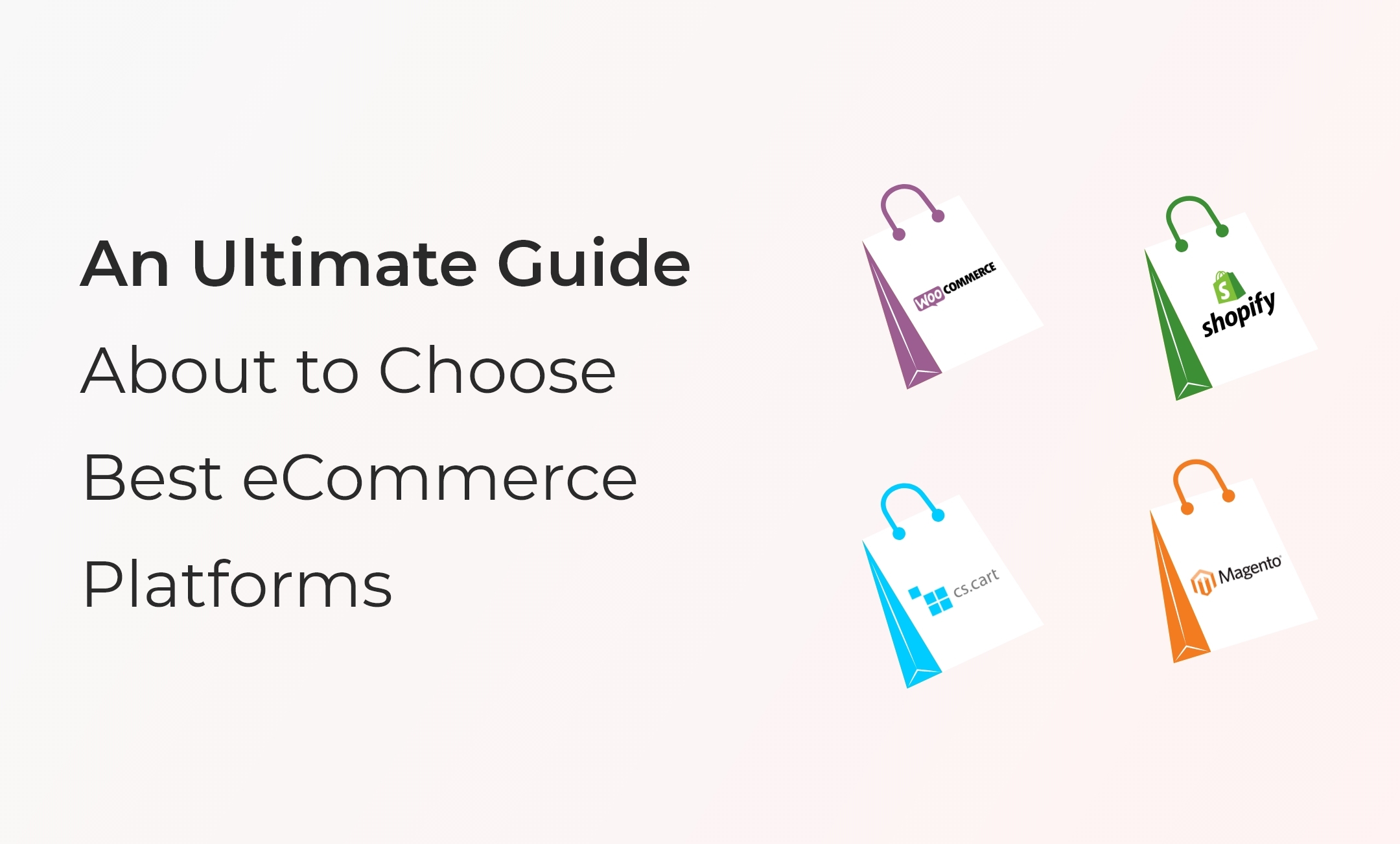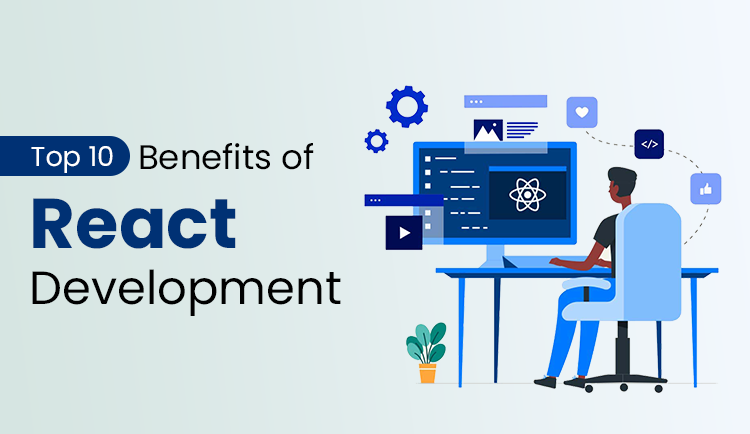
An Ultimate Guide to Choose Best eCommerce Platform
E-commerce has revolutionized how business is conducted. The Indian e-commerce market is expected to grow by 21.5% by 2022, reaching $74.8 billion, and is expected to increase to 188 billion US dollars by 2025.
If you’ve decided to improve your eCommerce software in order to maximize your market share, we’re delighted to inform you that you’re making a brilliant decision. However, selecting the best eCommerce platforms is not as simple as it may appear.
In this guide, we will walk you through the elements and considerations you must take into account while selecting the best eCommerce platform 2022.
So, let’s get started…
What exactly is an eCommerce platform?
An eCommerce platform is a software tool that enables small and large online businesses to manage their website, marketing, sales, and operations with ease.
Ecommerce systems, such as Wix, Shopify, Magento and BigCommerce, provide the robust capabilities required to run a business. Moreover, these top eCommerce platforms also connect you with popular business tools, allowing you to centralize your business operations and run your business according to your own preferences.
Instead of hosting your complete website on an eCommerce platform, you can build the experience of your website using a content management system (CMS) such as WordPress.
Then, you just integrate a shopping cart solution, such as BigCommerce, to act as the cart. This option provides your store with additional customization possibilities while being powered by the best eCommerce platforms.
Why selecting the best eCommerce platform is crucial for your company?
Creating an eCommerce business requires more than simply posting product listings online. It is considerably more sophisticated than you may realize. Building and operating an eCommerce business requires the same amount of strategic thinking and planning as a physical store.
And if you master this essential, you will be able to leverage the digital world to automate and streamline numerous tasks and activities that previously required human intervention.
However, when choosing the best eCommerce platform for small businesses, you must keep in mind the following four factors:
How rapidly your company is able to expand: This includes the cost of constructing your eCommerce platform as well as continuing development and maintenance expenses.
Customer Engagement: Customer engagement is the control you have over how customers connect with your company. The best eCommerce platform will allow you to provide the service you intended.
eCommerce Challenges: We must emphasize that many eCommerce sellers prefer to prioritize “skin-deep” issues such as design, UX branding, and content. However, the true eCommerce challenges lie within the business process, client interaction, and lead creation.
Return of Investment: All of these techniques can help you decide whether or not your eCommerce platform is generating a good return on investment.
Different Types of eCommerce Platforms
There are five distinct types of eCommerce platforms available for selection.
- Create your own eCommerce system
- Standard eCommerce platform
- Open-source eCommerce platform
- Cloud eCommerce platform
- eCommerce SaaS platform
What considerations should be made while picking the best eCommerce platform?
In addition to development and operation, there are additional things to consider while choosing the top eCommerce platform.
1. Hosting
First things first understand how to host. eCommerce platforms may be hosted locally or in the cloud. In the first option, you are responsible for hosting, installation, and maintenance updates. This could occasionally become costly. The benefit is increased control over the online platform and improved security administration. Additionally, you can view your data more clearly.
For a cloud-hosted platform, you can host your website with AWS (Amazon Web Services), implying that the cloud platform manages the uptime of the brand. It costs you less; however, you will have less control over the servers. Also, you won’t be able to tailor the server to your specific requirements.
2. Platform Ownership
When it comes to platform ownership, Open-Source, SaaS, and Headless platforms are available.
Since the source code of Open-Source platforms (WooCommerce and Magento, for example) is not only accessible but also modifiable, you can have greater control and ownership.
You would be accountable for web hosting, security, integrations (with CRM, CMS, or ESP, for example), and analytics. However, you cannot update or modify features in any way. Additionally, they may become too cumbersome and costly to maintain. They also require excessive technical knowledge.
A SaaS eCommerce solution implies renting a platform. In essence, it is less expensive than open-source alternatives.
The SaaS provider handles updates, security, hosting, and other software management tasks. The time to market is also reduced. However, the lack of adaptability and customization is cause for concern.
Modern consumers consume content and make purchases via digital touchpoints, such as smart wearables, voice-enabled devices, progressive web applications, etc. This requires the eCommerce platform to keep pace. Headless commerce enables you to remain relevant and provide a seamless shopping experience across all devices.
3. Vendor Experience and Expertise
Check the vendor’s experience and technical skill sets prior to finalizing one. It is to ensure they can satisfy the needs and complexities of your requirements. In addition, verify that they have both the knowledge and experience to work in your business.
Take the time to investigate case studies, customer feedback, and online communities to determine if the vendor can handle more than just development.
4. Scalability
Scalability is what most business owners aim for. While you’re looking for the best eCommerce platforms, see whether your eCommerce platform expands along with your business or not.
Your eCommerce platform is the hub of your organization. Know that a difficult-to-scale platform can limit the expansion of your firm.
5. Support
Support is something that you may need at any time. Hence, it is crucial to look for a company that provides you with complete support.
See whether the seller provides the essential support to assist you in resolving problems or issues if something goes wrong because you never know when things go wrong.
Always prioritize providers that offer 24-hour emergency assistance and can be reached via email, web chat, and phone.
6. SEO-Friendliness
Your eCommerce site will rank highly in search engine results if it is built on a platform that includes extensive SEO capabilities. Consider the following when searching for an SEO-friendly eCommerce platform:
- Integrating a blog with your eCommerce platform.
- Utilizing your own domain
- Permitting customers to provide ratings
7. Mobile-Friendliness
We are in an era where mobile-friendly platforms are a necessity. According to research, mobile commerce will account for one-third of retail eCommerce sales in the world. Hence, it is crucial to look for the best eCommerce platform that offers mobile-friendliness.
8. Security
Website security is of paramount importance in the digital age. In addition to stringent global regulations protecting consumer privacy, a security breach can damage one of your most valuable assets: trust.
Given that eCommerce is a digital platform that actively accepts financial transactions, you must ensure that your eCommerce supplier has the appropriate security protocols in place.
Because you manage so much sensitive information, you must examine the security credentials of the top eCommerce platforms you’re considering for current needs and future expansion.
While all have some level of protection built in, many also provide additional security options, such as DDoS attack monitoring and fraud protection.
The proprietors of e-commerce sites should be diligent in ensuring PCI compliance, SSL, and secure data backups.
Additionally, ensure that the platform you choose is Payment Card Industry (PCI) compliant. These regulations ensure that organizations that process or transmit credit card data maintain a secure environment.
9. Omnichannel Shopping Experience
The best eCommerce platforms simplify the delivery of an omnichannel shopping experience that engages customers wherever and whenever they choose to shop. This helps you build customer trust and provides a competitive advantage for your brand.
10. Pricing
Pricing is one of the primary considerations when evaluating each eCommerce platform. Whether you are a small business just starting out or a brick-and-mortar store moving online, you must understand the total cost of each platform.
Every platform will charge a monthly fee along with processing costs. When making decisions, initial and ongoing costs must be considered.
Do not sacrifice necessary items for a lower price. Consider the benefits and drawbacks to obtain the best value for your money.
11. Integrations and Plugins
Integrations and plugins are also crucial aspects to consider when determining whether it’s the best eCommerce platform or not.
Not all platforms offer every integration; therefore, you must fully comprehend your business needs in order to accurately evaluate the available features and functions.
12. Themes and the User Experience (UX)
Today’s consumers want to shop in environments that are engaging and immersive, not just to buy products.
The design of your online store is determined by its theme, and the best eCommerce platforms offer a variety of options. Some themes are included with the subscription at no additional cost, while others are premium and require payment.
It is worthwhile to invest in standing out from the competition because a well-designed experience is essential for converting browsers into buyers.
13. Performance
In an era where people are money rich but not time rich, your platform must provide an experience that is lightning fast. And this must remain constant as the business grows and expands. Choose the best eCommerce platform that grows with your business.
While evaluating the performance of a platform is not easy, you can examine the potential weak points, such as slow load times, frozen pages, 404 errors, and other sluggish performance indicators.
Understanding how the platform scales horizontally and vertically during peak traffic times, as well as reviewing the typical site speed, are crucial components of your evaluation.
14. Payment Gateways
Customers can pay for your products and services easily and with a variety of options. This implies that your store must be linked to a trustworthy, secure eCommerce payment gateway — a dedicated processor that transfers funds from customers’ bank accounts to your own in a secure manner.
This may seem obvious, but not every best eCommerce platform is compatible with every payment gateway. Localizing the payment process is essential.
Ensure that the platform you select offers a sufficient number of payment options to satisfy your primary customer base.
15. Personalization
Knowing your customer is fundamental to product marketing, and customization can be a game changer. Using machine learning and AI, you can provide your online customers with a personalized experience that distinguishes your website from the competition.
The best eCommerce platforms are outfitted with a recommendation engine that dynamically displays items for sale to shoppers based on criteria such as:
- Age, gender, geographic location, etc.
- Interest, character, and way of life
- Includes the type of device, the time of day, the weather, the location, etc.
- Recently viewed items, active searches, and products in abandoned shopping carts
- Previous purchases, email interactions, and membership in a loyalty program.
The best eCommerce platform can deliver a real-time, personalized experience to the customer based on a variety of data points.
Summing it up…
So these are the top tips you can utilize to select the best eCommerce platform. Know that choosing the right eCommerce platform can help you achieve exponential growth. Hence, follow these tips to make the best decision of your life and enjoy exponential growth.




